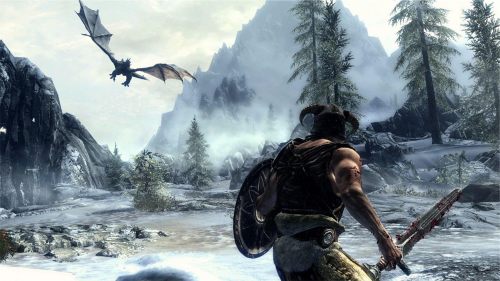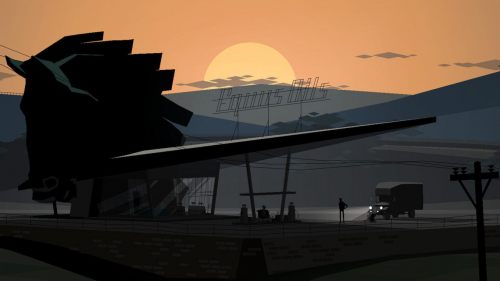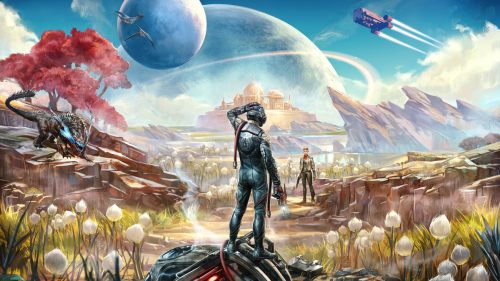MAFIA III Stars A Black Protagonist In 1968 Louisiana
The world’s largest video game convention took place in Cologne last week. Observing from afar, Gamescom seems a more genial affair than the likes of E3: more actual fans, fewer obnoxious press conferences. But all the major publishers save Sony showed up, bringing the usual avalanche of marketing you’d expect from a gaming event that size.
Some of the reveals were pretty fun! Star Wars Battlefront had some pew-pew starfighter action to show off; Mirror’s Edge Catalyst and Dark Souls III seem like thoughtful refinements of their predecessors; and Crackdown 3’s cloud-based destruction modeling is mighty impressive.. Both components of Activision Blizzard showed off expansions to their respective MMOs Destiny and World of Warcraft. More interesting were psychedelic survival game We Happy Few, Ron Gilbert’s old-school adventure Thimbleweed Park, and EA’s irresistibly cute Unravel.
Then come the eyebrow-raisers: Scalebound’s spectacularly douchebaggy protagonist, Forza’s kinda-creepy obsession with rain, and Homefront: The Revolution, mysterious in its very existence. Quantum Break appears to include a complete live-action TV series starring Aidan Gillen, Lance Reddick, Shawn Ashmore, and Dominic Monaghan. And Microsoft trotted out three Halo games: one standard shooter, one real-time strategy, and one Monopoly. So far, so video games.
But I’m only mentioning these things for completion’s sake. What’s really got me curious is the newly-announced Mafia III.
Mafia III moves on from the tired organised-crime settings of 1930s and 1950s New York and Chicago to 1968 New Orleans. The Big Easy is an unusual choice for a mob story and for a video game, and it lent a lot of character to Left 4 Dead 2. 1968 lies smack in the middle of the rise of the counterculture, and of public outcry about the Vietnam War. It was also a highly charged year for the civil rights movement – the year Martin Luther King Jr. was assassinated – which comes into play in another one of the game’s intriguing elements: its protagonist.
Lincoln Clay is a disenfranchised Vietnam vet, recently returned from the war, finding it hard to fit in anywhere in the country he’s returned to. He’s also black, in a time when being black could get you killed (which admittedly could refer to pretty much any time in America’s history, but bear with me). Clay is joined by a core crew made up of Cassandra, a black woman; Burke, a grumbly Irishman; and Vito Scaletta, the protagonist of Mafia II. Together with his lieutenants and a growing mob of his own, Lincoln goes on a mission of revenge against the Italian mafia, building up power and presumably taking back the streets.
This all sounds amazing! It’s rare that AAA games dig into issues this interesting - and how often do you see a black protagonist in a video game? (Seriously, ponder that and weep. I’m coming up with The Walking Dead, GTA: San Andreas, and little else.) But some gameplay was also shown, and it’s pretty concerning. Mafia III, like fellow Gamescom demo Rise of the Tomb Raider, is in grave danger of becoming one of those games whose gameplay disagrees completely with its story and themes.
The best games marry their gameplay to their stories and themes going on in the background. I’m talking about games like Spec Ops: The Line, which builds itself up as a military shooter before performing a subversive rug-pull; Brothers: A Tale of Two Sons, whose twin-stick single player co-op signifies the connection between its two protagonists; and Dark Souls, whose punishing difficulty and endless death reflects the decaying world in which it takes place.
Mafia III, on the other hand, seems torn between doing its story justice and delivering the kind of action that cuts good sizzle reels. One piece of gameplay saw a white cop harassing a black couple on the street, with the player forced to choose whether to interfere and risk a confrontation, or just walk on by. That kind of thing that could push Mafia III into a seriously interesting area. Games have been dealing with more and more mature topics, but they’ve kept race at arm’s length. It’s a bold choice on 2K’s part to engage with civil rights in this way, especially given recent surges in racial violence.
But the bulk of the gameplay is the standard Grand Theft Auto tryptych of running, driving, and shooting. That particular blend has been done so frequently that it’s reached a point that’s somehow both ridiculous and boring. It doesn’t matter how mature a game’s story is if its gameplay completely undermines it, and it’s going to be hard to take any lip service paid to social struggles seriously when Lincoln’s committing acts of mass murder on the regular.
The Mafia series has always been a bit of an outlier in the open-world genre, with the environment acting more as a backdrop to linear stories than as a sandbox in its own right. In this instalment, 2K is pushing the sandbox a little more as a world that reacts to Lincoln’s actions. Again, there’s a lot of potential here, given the setting, but it remains to be seen whether 2K capitalise on it.



